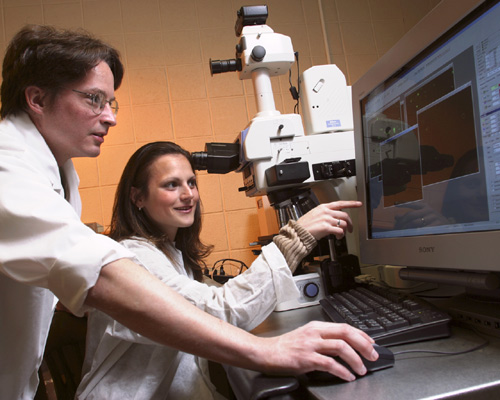Biology major Michelle Marinucci ’05 (Cinnaminson, N.J.) completed an independent research project in which she attempted to prevent the spread of cancer through antibodies.
She was among 14 Lafayette students who presented their research with biology faculty mentors during the 80th Annual Meeting of the Pennsylvania Academy of Science March 26-28.
“It was a good experience to gain exposure to explaining research to different types of people,” she says.
When cancer cells from a tumor metastasize, or spread, throughout the body, they invade nearby tissue, sometimes traveling to distant parts of the body. Marinucci painstakingly added antibodies to breast cancer cells suspended in a synthetic tissue substitute called matrigel in hopes of stopping the invasion of cancer to surrounding cells.
“In order to experience multiple aspects of the field, I thought it would be beneficial to pursue oncology (tumor) research from an immunological angle,” says Marinucci, who took immunology and infectious diseases classes with Robert Kurt, assistant professor of biology, before beginning her project. “I found both of these subjects intriguing and on the cutting edge of biology.”
Marinucci, who also conducted research in pharmacogenetics, the study of genetic factors that influence an organism’s reaction to a drug, at the University of Pennsylvania over the past three summers, says her latest research “taught me to use a variety of techniques and protocols that I had not experienced.”
Kurt says Marinucci’s specific role in the research, part of a larger project to investigate a mouse model of breast cancer metastasis, focused on whether proteins called chemokines, which are produced by tumor cells, play a role in a tumor’s invasiveness.
“She did this by blocking the chemokines using antibodies and then looking at whether the invasiveness of the tumor was altered,” Kurt says.
“Michelle generated some great data,” he adds. “Although inhibition of the chemokine did not significantly influence the invasiveness of the tumor cells, it did modestly inhibit production of a protein called VEGF (vascular endothelial growth factor). Tumors produce this protein so they can generate their own blood vessels. Importantly, tumors need blood vessels to survive and can use these vessels for metastasis. So there is still a possibility that this chemokine participates, but it will require much more work to determine for sure.”
A leading cancer researcher who regularly involves Lafayette students in his work, Kurt has received National Science Foundation and Department of Defense grants totaling more than $350,000 since 2001. His research has been published in ten different scientific journals, including articles coauthored with Lafayette students. He is serving his second year as a scientific reviewer for Congressionally Directed Medical Research Programs for Prostate Cancer Research.
The professor says he enjoyed mentoring Marinucci for this project.
“Michelle is great to have in the laboratory,” he explains. “She takes her work seriously and the focus and skills she possesses show in the quality of her work. In one semester, she has been able to generate publishable data.”
Marinucci says the work required patience, independence, confidence, and a healthy respect for sophisticated laboratory equipment and supplies.
“Every experiment is so costly,” she says. “You don’t want to break anything or add anything in the wrong way.”
While Marinucci hopes to study dentistry after graduation, she says her research in oncology will serve her well.
“A lot of what students do in dental school relates to lab work,” she says. “By gaining experience in the lab, I can be better prepared for a career in health care.”
Marinucci points out that Kurt has helped a great deal in strengthening her laboratory skills and confidence.
“I feel fortunate to have Dr. Kurt as both a teacher and a mentor,” she says. “His patience and skill in the lab makes the environment comfortable, yet challenging.”
Marinucci says Lafayette’s facilities and small class sizes gave her the nudge she needed to pursue independent study.
“I don’t think that if I’d been in a bigger classroom I’d have had the kind of relationship with Dr. Kurt to be able to ask him about doing research,” she says.
Marinucci, who volunteers with a College Hill day care center, plans to tutor students in organic chemistry and serve as a teaching assistant for Kurt’s Immunology class next semester.
She is a graduate of Moorestown Friends School.
Independent study courses are among several major opportunities at Lafayette that make the College a national leader in undergraduate research. Lafayette sends one of the largest contingents to the National Conference on Undergraduate Research each year. Forty-two students were accepted to present their work at the conference this month.

A National Leader in Undergraduate Research. Michelle Marinucci ’05, who conducted cancer research with Robert Kurt, assistant professor of biology, is one of 22 Lafayette students who will present their research to the PA Academy of Science.

1 Comment
Comments are closed.